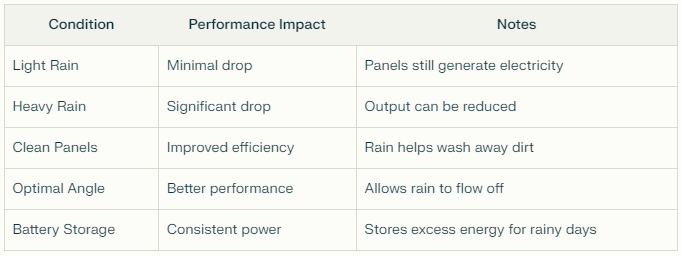
Introduction
As a homeowner considering solar energy, you may be wondering, "Do solar panels work on rainy days?"
This is a common concern, especially for those living in regions known for their wet weather.
In this article, we’ll explore solar panel performance during rainy days, discussing what you can expect and how to maximize your solar energy system's efficiency even when the skies are open up.
Understanding Solar Panel Performance on Rainy Days
First off, let's clear up a misconception: solar panels do work in the rain.
While they achieve peak performance in direct sunlight, they can still generate electricity even when it’s cloudy or drizzling.
How Rain Affects Solar Panel Output
The performance of solar panels on rainy days can vary based on several factors:
1. Light Rain: During light rain, solar panels can still produce energy. They might not hit their maximum output, but they are still generating power.
2. Heavy Rain: When it pours, the output may drop significantly. Rain can scatter and absorb sunlight, reducing the amount that reaches your panels.
3. Panel Angle: The angle at which your solar panels are installed plays a crucial role. Panels installed at the right angle can shed rainwater effectively, maintaining better performance.
The Impact of Rain on Solar Panel Efficiency

Benefits of Rain for Solar Panels
Believe it or not, rain can actually be beneficial for solar panels. Here’s how:
- Natural Cleaning: Rain acts as a natural cleaning agent, washing away dust and debris that accumulate on the panels. Clean panels capture more sunlight, enhancing efficiency when the rain stops.
- Cooler Temperatures: Rain often brings cooler temperatures. This can improve solar panel efficiency since they operate better without overheating.
- Extended Lifespan: Cooler and cleaner conditions can help extend the lifespan of your solar panels. Less wear and tear means more years of reliable energy production.
Challenges of Solar Panel Performance on Rainy Days
While rain has its perks, there are challenges to consider:
- Reduced Energy Production: The intensity of the rain and cloud cover can significantly reduce energy generation. You might see a drop in output, especially during prolonged rainy periods.
- Potential Damage: Severe storms can pose risks to solar panels. High winds and heavy rains can affect the physical integrity of the panels and their mounting systems.
Innovations in Solar Technology for Rainy Conditions
With advancements in technology, solar panels are becoming more resilient to various weather conditions, including rain.
For example, Sunpal Solar utilizes TOPCon 2.0 technology and HJT 2.0 technology in their bifacial and monofacial solar modules.
These innovations enhance performance in low-light conditions, allowing panels to harness a broader spectrum of light. This means they can generate electricity even when the sun is hiding behind clouds.
Key Features of Sunpal Solar Panels
- High Efficiency: Sunpal's advanced solar modules ensure higher cell efficiency and power output.
- Waterproof Performance: The use of PIB-based sealants provides stronger waterproofing and better airtightness, extending the service life of the modules.
- Durability: These panels meet stringent international standards, ensuring top-notch quality and compliance with industry regulations.
Tips to Maximize Solar Panel Performance on Rainy Days
Want to get the most out of your solar panels when it rains? Here are some practical tips:
- Regular Maintenance: Keep your panels clean and free from debris. Even though rain helps, it’s good to check for any grime that might block sunlight.
- Consider Battery Storage: Investing in battery storage can help you store excess energy generated on sunny days. This way, you have power available when the rain clouds roll in.
- Monitor Performance: Keep an eye on your solar output. Understanding how your system performs during rainy weather can help you make informed decisions about maintenance and upgrades.
Installation Tips for Optimal Performance
- Install at the Right Angle: Ensure your solar panels are installed at an angle that allows rainwater to flow off easily. This helps keep the panels clean and functional.
- Avoid Shadows: Position your panels to avoid shading from nearby trees or buildings. Shadows can significantly reduce energy production, especially during rainy days.
Conclusion: Embracing Solar Panel Performance on Rainy Days
In conclusion, solar panel performance on rainy days isn’t as bleak as it might seem.
While rain can affect energy production, solar panels are designed to work even in less-than-ideal conditions.
With the right technology and maintenance, you can optimize your system to ensure it continues to deliver clean energy, rain or shine.
So, if you’re considering solar energy, don’t let the rainy season deter you. Embrace it, knowing your solar panels are still hard at work!
Summary Table: Solar Panel Performance on Rainy Days

By understanding how your solar panels perform during rainy days, you can make informed decisions that maximize your investment in solar energy.
